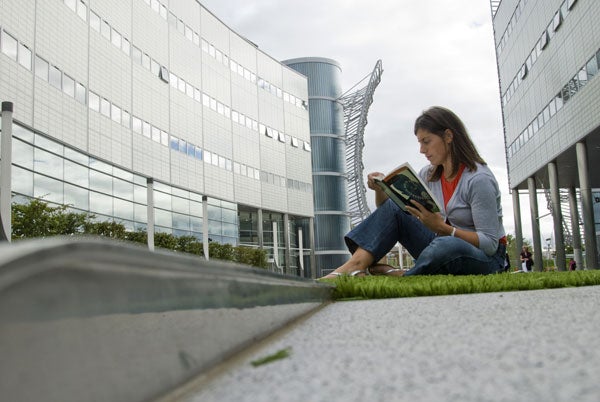Northumbria University heads south to get the London look
Northumbria is opening a new base in the capital to establish a fashion presence in one of the world's style centres.

Next month, a university in the North-east of England will be opening a southern outpost in London when the University of Northumbria sets up shop in trendy Islington. The Northumbria school of design in Newcastle, which is famous for its fashion degrees and award-winning fashion students, hopes to take the capital by storm with its new base round the corner from the Business Design Centre.
"Our fashion school has a great reputation but it remains the case in fashion that it is key to have a presence in one of the world's fashion cities," says the vice-chancellor Professor Andrew Wathey. "For a while we had had our annual fashion show in London as well as the North-east but this will give us a footprint near the centre of the discipline."
Northumbria's decision to establish itself in London illustrates its confidence and ambition. Students from the North-east will study and live in London, undertake placements at fashion houses in the capital and, it is hoped, move more easily into jobs in what is now a global marketplace. The development shows how serious the university is about making its mark.
The former Newcastle Poly is on a roll. Its research reputation is rising. As a result of the 2008 Research Assessment Exercise its research funds more than doubled from £1.3m to £3.3m. In the most recent Complete University Guide published in The Independent it came 58th out of 114 universities, up from 73rd position the year before.
And its new-vice chancellor, Professor Wathey, formerly of Royal Holloway, University of London, has mapped out a new vision for the place. "There are three kinds of university now," he says. "There are 30 to 35 universities that are funded across the board for research, there are another 30 to 35 that are engaged with research and focused on business and very strong on student experience, and then there are those with a different kind of mission."
The Oxford-educated Wathey is saying that you cannot divide universities any longer into two – those that were universities before 1992 and those that became universities after that date. The former polytechnics themselves differ from one another. There are the universities like Northumbria, Oxford Brookes, Bournemouth, Hertfordshire and the University of the West of England that do both teaching and research rather well and take large numbers of adults on postgraduate training courses; and there are the rest that are still primarily teaching institutions.
This middle group of universities engaged in both teaching and research has formed a new organisation called the Alliance Group to rival the Russell Group (of research-intensive universities) and the Million+ group of new universities. Wathey is their chairman. They may well be annoying the other groups, particularly Million+, but Wathey clearly feels it is worth the risk.
"When I came to Northumbria, I said I wanted to build research," says Wathey. "I felt that we were not really playing to our strengths."
The result is that he has established a strategic investment fund. Over five years the university plans to spend £17.8m hiring clever academics who will burnish Northumbria's reputation as a smart institution that is going places.
"We advertised 40 new academic posts last spring and we're planning another campaign this academic year," he says. "This is not about pulling in research prima donnas who will sit and just do research. It's about pulling in really strong academics who will begood teachers and researchers."
He is hiring the new academics across all nine schools at the university and is hoping to double the research capacity in preparation for the next research assessment in 2013.
"Research is a fundamental part of being a university," he says. "If you don't have it, you are either an institute or a school. Students want it and academics expect to do it."
To improve its research, Northumbria has also been investing in PhD students who are given excellent working space. Design students undertaking doctorates have their own centre for design research where they work together and bounce ideas off one another; and other humanities students are given their own desks and computers in another large room.
With the new design campus opening in London, the university can claim that it is doing all it can to get its graduates ready for work. It already has an employment rate of 91 per cent three years after graduation. Who knows, that proportion could go higher.
Northumbria Profile
* Vital statistics A big university with 34,000 students on two campuses in Newcastle. Mainly Seventies buildings designed by T Dan Smith.
* Added value Has more adults on postgraduate-taught courses than any other university in the region; 91 per cent of students are in graduate-level work three years after leaving. There's a university art gallery and a new £30m sports hall.
* Who's the boss? Professor Andrew Wathey, who studied music at Oxford.
* Glittering alumni The pop star Sting; Rodney Bickerstaff, former general secretary of Unison; Scott Henshall, fashion designer; Jonathan Ive, one of the designers of the iPod and the iMac; Victoria Pendleton, the Olympic gold medal track cyclist.
Join our commenting forum
Join thought-provoking conversations, follow other Independent readers and see their replies
Comments
Bookmark popover
Removed from bookmarks